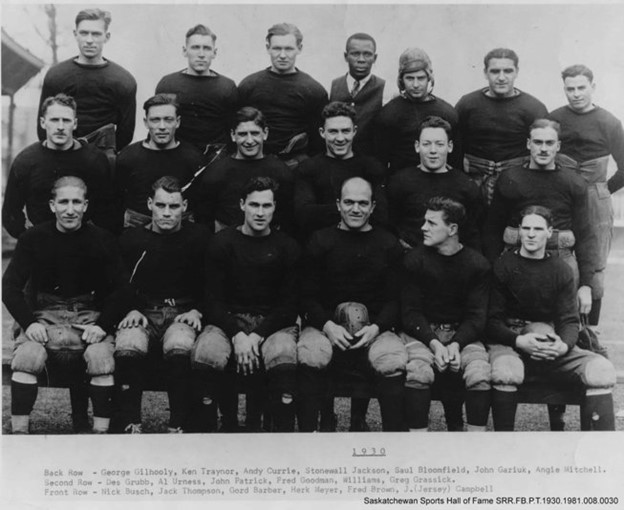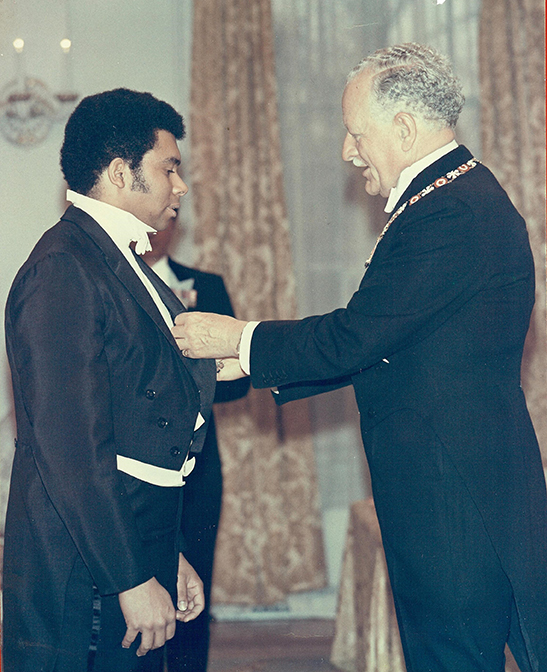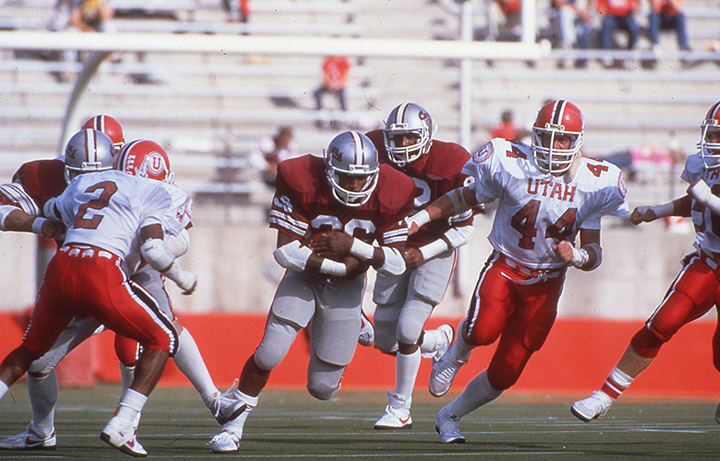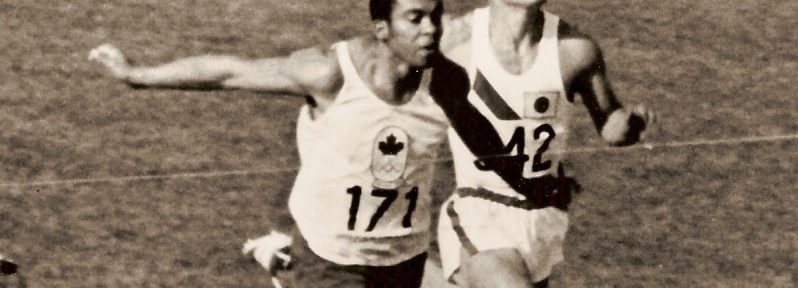February is African-Canadian Black History Month and this year the Saskatchewan Sports Hall of Fame is pleased to launch a new educational outreach program History of Black Athletes and Their Impact on Saskatchewan Sport.
The new program is being offered to schools across the province year-round as part of the SSHF’s educational programming.
History of Black Athletes shares the stories of pioneers like Robert Ellis “Stonewall” Jackson who became the first black player to suit up for the Roughriders on October 25, 1930, against the Moose Jaw Maroons. Jackson had a 45-yard run and recovered a fumble for a Riders touchdown in an auspicious debut. Jackson became the first black player to play in Grey Cup when the Riders faced Balmy Beach in Toronto in 1930. Jackson worked his day job as a railway porter on the trip from Regina to Toronto before playing the game and working on the trip back home.

The 1930 Regina Roughriders.
Players like Gabe Patterson in 1947, Chester “Cookie” Gilchrist in 1958, and Ed Buchanan and George Reed in 1963 came north to play football with the Riders and continued to break down barriers as they battled discrimination. Reed has related that he lived in a hotel for his first two years in Regina because he couldn’t find a landlord who would rent an apartment to him.
The History of Black Athletes program also highlights the stories of two recent inductees.
Harry Winston Jerome, OC had an incredible athletic career that was even more remarkable considering the adversity he faced.
Jerome was born in Prince Albert and when he was 12, the family settled in North Vancouver, B.C. There, locals tried to block the sale of a house to the Jerome family because of their race. The Jerome siblings had rocks thrown at them on their first day of school.
At the age of 19, Jerome burst into the global spotlight when he matched the world record time in the 100-metre sprint at the Canadian Olympic trials in Saskatoon. At the 1960 Rome Olympics, Jerome pulled up with a hamstring injury in the 100m semifinal. Several newspapers in Canada questioned his character with one even labelling him as a “quitter.”
At the 1962 British Empire and Commonwealth Games, Jerome tore his quadriceps tendon and pulled up lame to finish last in the 100-yard final. The injury was so severe that he missed an entire year of competition. Even today an injury of that nature would be difficult to return from, but in 1962 it was unheard of and it was feared that Jerome’s career was over.

Harry Jerome receives the Order of Canada. photo courtesy of the BC Sports Hall of Fame
Instead, he returned to competition and silenced any critics he had with an incredible comeback that spoke to his character. He won an Olympic bronze medal at the 1964 Tokyo Olympics and won the 100m gold at the British Commonwealth Games in 1966.
In total Jerome owned seven different world records over his career. He also completed his master’s degree in Education at the University of Oregon (where he was also a decorated sprinter) and after retiring in 1969, Prime Minister Pierre Trudeau asked him to help create Canada’s new Ministry of Sport.
He was made an Officer of the Order of Canada in 1970 and was named British Columbia’s Athlete of the Century. Today a statue of Jerome is prominently displayed in Stanley Park in Vancouver.
The National Film Board of Canada has an excellent documentary about Harry Jerome entitled Mighty Jerome by Ileana Pietrobruno. She also made a short film for the NFB, titled Harry Jerome: The Fastest Man on Earth which is available below:
Harry Jerome : The Fastest Man on Earth, Ileana Pietrobruno, provided by the National Film Board of Canada
Rueben Mayes’ family history is a fascinating chapter in the story of the province. A group of black families – some of whom were freed slaves – left Oklahoma in 1910 with the promise of affordable land and the hope of finding a more accepting place to call home. The group named themselves the Shiloh people, named after the Biblical town where the once-enslaved Israelites rested on their search for the Promised Land after fleeing Egypt. They settled just north of Maidstone between Lloydminster and North Battleford.
Mayes’ great-grandfather Joe Mayes was the minister of Shiloh Baptist Church which was built by the settlers and is now a heritage site. Rueben’s great-grandmother Mattie Mayes was a midwife, an educator and a spiritual leader in the community. Approximately 1,000 African-Americans came to Saskatchewan as part of the migration, but in 1912, the Canadian government began discouraging black immigration. They went so far as to send emissaries to black communities in America to dissuade them from coming to Saskatchewan.
Rueben Mayes would be born in North Battleford in 1963 and would go on to become one of the greatest football players ever produced in Canada. He became the first Canadian to be a finalist for the Heisman Trophy representing the best college football players in America. He was a consensus All-American in 1984 and broke the NCAA’s single-game rushing record that same year for Washington State.

Rueben Mayes runs to daylight with Washington State. photo courtesy Washington State University
Mayes would go on to play six seasons in the National Football League. He was the NFL Offensive Rookie of the Year and was named to the Pro Bowl team twice while playing for the New Orleans Saints.
Like Jerome, Mayes would go on to complete his Master’s degree, completing an MBA after retiring.
The Black Business and Professional Association created the Harry Jerome Awards in 1983 shortly after Jerome died. For more than 40 years the Harry Jerome Awards have celebrated black achievement in Canada in a dozen categories from business and entrepreneurship to sports and the arts. Mayes himself was honoured with a Harry Jerome Award.


